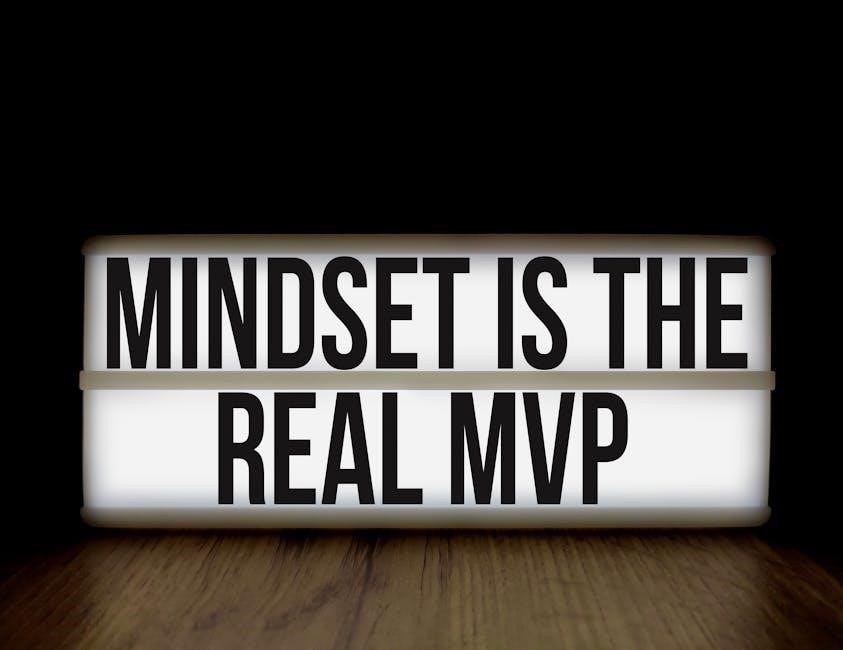The growth mindset, developed by Carol Dweck, emphasizes that abilities can be developed through effort, while a fixed mindset believes they are innate. Understanding these concepts is crucial for personal and professional growth, as they shape how individuals approach challenges, effort, and success.
1.1 Overview of Mindset Theory by Carol Dweck
Carol Dweck, a renowned psychologist, introduced the concept of mindsets, distinguishing between growth and fixed mindsets. Her theory, developed over decades of research, suggests that individuals either believe their abilities can be developed (growth mindset) or are innate and unchangeable (fixed mindset). Dweck’s work highlights how these beliefs profoundly influence behavior, effort, and resilience in the face of challenges. A growth mindset fosters a love for learning and persistence, while a fixed mindset often leads to avoidance of challenges to protect self-image. Her insights have transformed understanding of human potential and motivation, emphasizing the power of mindset in shaping success.
1.2 Importance of Understanding Mindsets for Success
Understanding mindsets is crucial for achieving success, as it shapes how individuals approach challenges, effort, and setbacks. A growth mindset fosters resilience, creativity, and continuous improvement, enabling people to embrace obstacles as opportunities for growth. Conversely, a fixed mindset can limit potential by discouraging effort and risk-taking. Recognizing these mindsets empowers individuals to adopt strategies that enhance their abilities and perseverance, ultimately driving personal and professional achievement. By cultivating awareness, people can unlock their full potential and navigate life’s challenges with confidence and adaptability, leading to greater fulfillment and success in various aspects of life.
Definitions of Growth and Fixed Mindsets
A growth mindset believes abilities can develop through effort, while a fixed mindset views them as innate. These definitions shape how individuals perceive challenges, effort, and success.
2.1 Growth Mindset: Belief in Development of Abilities
A growth mindset is rooted in the belief that abilities and intelligence can be cultivated through dedication and hard work. Individuals embrace challenges, viewing them as opportunities to learn and grow. They understand that effort enhances skill development and resilience. This mindset fosters a love for learning, persistence, and adaptability, enabling personal and professional progress. By focusing on improvement rather than perfection, growth-oriented individuals thrive in dynamic environments, turning obstacles into stepping stones for success.

2.2 Fixed Mindset: Belief in Innate Abilities
A fixed mindset assumes that intelligence, talents, and abilities are innate and unchangeable. Individuals believe success stems from natural gifts rather than effort. They avoid challenges to prevent failure, fearing it may expose limitations. Effort is seen as unnecessary if one is already talented. This mindset focuses on demonstrating existing abilities rather than developing new ones. People with a fixed mindset may shy away from opportunities for growth, believing their capabilities are static. This rigid perspective can hinder resilience and limit personal and professional development, as challenges are seen as threats rather than learning opportunities.

Key Differences Between Growth and Fixed Mindsets
Growth mindsets embrace challenges, view effort as growth opportunities, and focus on progress, while fixed mindsets avoid challenges, see effort as unnecessary, and prioritize perfection over learning.
3.1 Embracing Challenges vs. Avoiding Challenges
Individuals with a growth mindset actively seek and embrace challenges, viewing them as opportunities to learn and grow. In contrast, those with a fixed mindset tend to avoid challenges, fearing failure or the risk of appearing unintelligent. This fundamental difference in approach stems from their beliefs about ability and intelligence. Growth-minded individuals see effort as a pathway to improvement, while fixed-minded individuals often believe that success should come naturally without struggle. This divergence in attitudes toward challenges significantly influences personal development, resilience, and long-term success in various aspects of life.
3.2 Viewing Effort as Opportunities for Growth vs. Seeing Effort as Unnecessary
Those with a growth mindset perceive effort as a vital tool for development and improvement. They understand that dedication and hard work are essential for achieving their goals. Conversely, individuals with a fixed mindset often view effort as unnecessary or even demeaning, believing that innate talent alone should suffice. This stark contrast highlights differing attitudes toward personal development. Growth-minded individuals embrace effort as a means to progress, whereas fixed-minded individuals may avoid it, fearing it reflects inadequacy or a lack of natural ability.
3.3 Responding to Failure as a Learning Opportunity vs. Viewing Failure as a Threat
Individuals with a growth mindset view failure as a valuable learning experience. They analyze setbacks to identify areas for improvement and use them as stepping stones for growth. In contrast, those with a fixed mindset perceive failure as a threat to their ego and self-image. They tend to avoid challenges that might lead to failure, fearing it will expose their inadequacies. This difference in perspective profoundly impacts resilience and progress, with growth-minded individuals embracing failure as a teacher, while fixed-minded individuals see it as a source of discouragement and defeat.
3.4 Focus on Progress vs. Focus on Perfection
A growth mindset prioritizes progress, celebrating small improvements and incremental growth. Individuals embrace the journey of learning, valuing effort and persistence over immediate results. Conversely, a fixed mindset seeks perfection, often leading to frustration when unrealistic standards aren’t met. This focus on perfection stifles creativity and risk-taking, as failure is seen as unacceptable. By contrast, growth-minded individuals find joy in the process, understanding that progress, not perfection, is the path to mastery and lasting success. This shift in focus fosters resilience and a more fulfilling approach to personal and professional development.

Practical Applications of Growth Mindset
A growth mindset can be applied in education, workplace, and daily life, fostering resilience, creativity, and continuous improvement. It encourages lifelong learning and personal development.
4.1 Education: Fostering a Growth Mindset in Students
Educators play a crucial role in cultivating a growth mindset in students. By praising effort rather than talent, providing constructive feedback, and encouraging persistence, teachers can help students embrace challenges. Creating a supportive environment where mistakes are seen as learning opportunities fosters resilience and motivation; Incorporating growth mindset principles into curricula and classroom practices can empower students to believe in their ability to grow and improve, leading to greater academic and personal success. This approach not only enhances learning but also prepares students for lifelong development and adaptability in an ever-changing world.
4.2 Workplace: Encouraging Growth Mindset for Professional Development
Encouraging a growth mindset in the workplace fosters a culture of continuous learning and development. Leaders can promote this by valuing effort, providing constructive feedback, and offering growth opportunities. Employees with a growth mindset are more likely to embrace challenges, adapt to changes, and innovate. Organizations can support this by investing in training programs, encouraging collaboration, and celebrating progress. A growth mindset not only enhances individual performance but also drives team success and organizational resilience. By nurturing this mindset, companies can create a workforce that thrives on development and is better equipped to meet future challenges.
4.3 Personal Growth: Applying Mindset Principles in Daily Life
Applying a growth mindset in daily life empowers individuals to embrace challenges as opportunities for growth. By viewing effort as a path to improvement, people can overcome obstacles and achieve personal goals. Practicing self-awareness and reflection helps identify fixed mindset thoughts, allowing individuals to reframe them. Persistence, resilience, and a focus on progress rather than perfection foster continuous development. Incorporating mindset principles into daily routines enhances problem-solving skills, relationships, and overall well-being. This approach encourages individuals to take ownership of their growth, leading to a more fulfilling and purposeful life. Mindset practices become a powerful tool for lifelong personal evolution and success.

How to Cultivate a Growth Mindset
Cultivating a growth mindset involves embracing challenges, viewing effort as growth opportunities, and learning from failures. It requires shifting from believing abilities are fixed to understanding they can evolve through dedication and persistence.
5.1 Recognizing and Challenging Fixed Mindset Thoughts
Recognizing fixed mindset thoughts involves identifying beliefs that abilities are innate and unchangeable. Challenging these thoughts requires reframing them to emphasize growth and development. For example, instead of thinking, “I’m not good at this,” one could say, “I can improve with practice.” This shift fosters resilience and a willingness to embrace challenges. By becoming aware of fixed mindset triggers, individuals can actively replace limiting beliefs with growth-oriented perspectives, ultimately nurturing a more adaptive and progressive approach to learning and success.
5.2 Strategies for Developing a Growth Mindset
Developing a growth mindset involves embracing challenges, viewing effort as a path to growth, and learning from failures. Practice self-reflection to identify fixed mindset triggers and reframe limiting beliefs. Celebrate progress, no matter how small, and seek feedback as a tool for improvement. Surround yourself with supportive environments that encourage learning and persistence. Carol Dweck’s research highlights the importance of mindset-shaping practices, such as affirming abilities through effort and resilience. Consistent application of these strategies fosters long-term personal and professional development, leading to greater confidence and achievement.
Cultivating a growth mindset empowers individuals to embrace challenges, persist through obstacles, and view failure as a stepping stone to success, fostering lifelong growth and achievement.
6.1 The Power of Mindset in Achieving Success
Mindset plays a critical role in determining success. A growth mindset fosters resilience, enabling individuals to view challenges as opportunities for growth and learning. By embracing effort and perseverance, those with a growth mindset overcome obstacles and achieve sustained success. In contrast, a fixed mindset limits potential by avoiding challenges and fearing failure. Carol Dweck’s theory highlights that mindset is not inherent but can be cultivated. Adopting a growth mindset unlocks possibilities, empowering individuals to adapt, innovate, and thrive in an ever-changing world, making it a powerful tool for long-term achievement and fulfillment.
